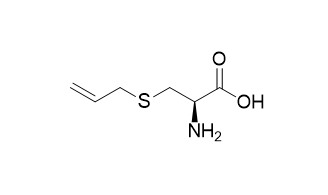S-Allyl-L-cysteine
S-Allyl-L-cysteine exerts its neuroprotective effect by scavenging ONOO− and inhibiting the ERK signaling pathway activated during initial hypoxic/ischemic insults. S-Allyl-L-cysteine could protect against the neuronal cell death that is triggered by ER dysfunction in the hippocampus, and that it has no effect on neuronal cell death that is dependent upon the caspase-3 mediated pathway.
Inquire / Order:
manager@chemfaces.com
Technical Inquiries:
service@chemfaces.com
Tel:
+86-27-84237783
Fax:
+86-27-84254680
Address:
1 Building, No. 83, CheCheng Rd., Wuhan Economic and Technological Development Zone, Wuhan, Hubei 430056, PRC
Providing storage is as stated on the product vial and the vial is kept tightly sealed, the product can be stored for up to
24 months(2-8C).
Wherever possible, you should prepare and use solutions on the same day. However, if you need to make up stock solutions in advance, we recommend that you store the solution as aliquots in tightly sealed vials at -20C. Generally, these will be useable for up to two weeks. Before use, and prior to opening the vial we recommend that you allow your product to equilibrate to room temperature for at least 1 hour.
Need more advice on solubility, usage and handling? Please email to: service@chemfaces.com
The packaging of the product may have turned upside down during transportation, resulting in the natural compounds adhering to the neck or cap of the vial. take the vial out of its packaging and gently shake to let the compounds fall to the bottom of the vial. for liquid products, centrifuge at 200-500 RPM to gather the liquid at the bottom of the vial. try to avoid loss or contamination during handling.
J Cell Physiol.2021, 236(3):1950-1966.
Food Sci Biotechnol.2024, 33(15):3629-3637.
Biomed Pharmacother.2022, 156:113929.
Industrial Crops and Products2023, 199:116746.
J Funct Foods2019, 54:449-456
J.Pharm. & Biome. Anal.2023, 2: 100018.
Semyung University2017, 149407
Appl. Sci.2020, 10(4),1304
Foods.2022, 12(1):136.
J Biomol Struct Dyn.2022, 5;1-17.
Related and Featured Products
Neuroence, 2003, 122(4):885-895.
S-allyl-l-cysteine selectively protects cultured rat hippocampal neurons from amyloid β-protein- and tunicamycin-induced neuronal death.[Reference:
WebLink]
S-Allyl-L-cysteine (SAC), one of the organosulfur compounds found in aged garlic extract, has been shown to possess various biological effects including neurotrophic activity. In our previous experiments, we found that SAC could protect against amyloid β-protein (Aβ)- and tunicamycin-induced cell death in differentiated PC12 cells.
METHODS AND RESULTS:
In the study described here, we characterized the neuronal death induced by Aβ, 4-hydroxynonenal (HNE), tunicamycin, and trophic factor deprivation, and investigated whether and how SAC could prevent this in cultured rat hippocampal neurons. Treatment with SAC protected these cells against Aβ- and tunicamycin-induced neuronal death, which is mediated predominantly through caspase-12-dependent pathway in a concentration-dependent manner. In contrast, it afforded no protection against HNE- and trophic factor-deprivation-induced cell death, which has been shown to be mediated by caspase-3-dependent pathway. SAC also attenuated the Aβ-induced increase of intracellular reactive oxygen species in hippocampal neurons. SAC had no effect on Aβ-induced cell death in cultured cerebellar granule neurons, which was prevented by a caspase-3 inhibitor.
CONCLUSIONS:
These results suggest that SAC could protect against the neuronal cell death that is triggered by ER dysfunction in the hippocampus, and that it has no effect on neuronal cell death that is dependent upon the caspase-3 mediated pathway.
Free radical research, 2006, 40(8):827-35.
S-Allyl-l-cysteine attenuates cerebral ischemic injury by scavenging peroxynitrite and inhibiting the activity of extracellular signal-regulated kinase.[Reference:
WebLink]
S-Allyl-L-cysteine (SAC) has been shown to reduce ischemic injury due to its antioxidant activity. However, the antioxidant property of SAC has been controversial. The present study investigated the neuroprotective mechanism of SAC in cerebral ischemic insults.
METHODS AND RESULTS:
SAC decreased the size of infarction after transient or global ischemic insults. While it did not alter the N-methyl-d-aspartate excitotoxicity, SAC significantly scavenged the endogenously or exogenously produced ONOO− and reduced ONOO− cytotoxicity. In contrast, SAC has much lower scavenging activity against H2O2, or NO. Further, SAC inhibited the activity of extracellular signal-regulated kinase (ERK) increased in cultured neurons exposed to oxygen-glucose deprivation or in rat brain tissue after transient middle cerebral artery occlusion. The neuroprotective effect of SAC was mimicked by the ERK inhibitor U0125.
CONCLUSIONS:
The present results indicate that SAC exert its neuroprotective effect by scavenging ONOO− and inhibiting the ERK signaling pathway activated during initial hypoxic/ischemic insults.



